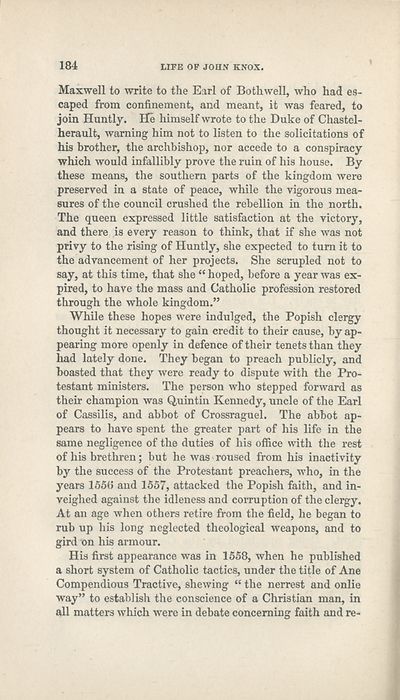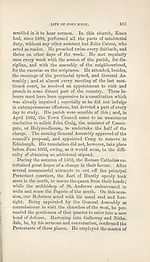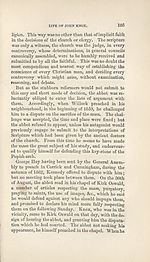Download files
Complete book:
Individual page:
Thumbnail gallery: Grid view | List view

184
LIFE OF JOHN KNOX.
Maxwell to write to the Earl of Both well, who had es¬
caped from confinement, and meant, it was feared, to
join Huntly. He himself wrote to the Duke of Chastcl-
herault, warning him not to listen to the solicitations of
his brother, the archbishop, nor accede to a conspiracy
which would infallibly prove the ruin of his house. By
these means, the southern parts of the kingdom were
preserved in a state of peace, while the vigorous mea¬
sures of the council crushed the rebellion in the north.
The queen expressed little satisfaction at the victory,
and there is every reason to think, that if she was not
privy to the rising of Huntly, she expected to turn it to
the advancement of her projects. She scrupled not to
say, at this time, that she “ hoped, before a year was ex¬
pired, to have the mass and Catholic profession restored
through the whole kingdom.”
While these hopes were indulged, the Popish clergy
thought it necessary to gain credit to their cause, by ap¬
pearing more openly in defence of their tenets than they
had lately done. They began to preach publicly, and
boasted that they were ready to dispute with the Pro¬
testant ministers. The person who stepped forward as
their champion was Quintin Kennedy, uncle of the Earl
of Cassilis, and abbot of Crossraguel. The abbot ap¬
pears to have spent the greater part of his life in the
same negligence of the duties of his office with the rest
of his brethren; but he was roused from his inactivity
by the success of the Protestant preachers, who, in the
years 1558 and 1557, attacked the Popish faith, and in¬
veighed against the idleness and corruption of the clergy.
At an age when others retire from the field, he began to
rub up his long neglected theological weapons, and to
gird on his armour.
His first appearance was in 1558, when he published
a short system of Catholic tactics, under the title of Ane
Compendious Tractive, shewing “ the nerrest and onlie
way” to establish the conscience of a Christian man, in
all matters which were in debate concerning faith and re-
LIFE OF JOHN KNOX.
Maxwell to write to the Earl of Both well, who had es¬
caped from confinement, and meant, it was feared, to
join Huntly. He himself wrote to the Duke of Chastcl-
herault, warning him not to listen to the solicitations of
his brother, the archbishop, nor accede to a conspiracy
which would infallibly prove the ruin of his house. By
these means, the southern parts of the kingdom were
preserved in a state of peace, while the vigorous mea¬
sures of the council crushed the rebellion in the north.
The queen expressed little satisfaction at the victory,
and there is every reason to think, that if she was not
privy to the rising of Huntly, she expected to turn it to
the advancement of her projects. She scrupled not to
say, at this time, that she “ hoped, before a year was ex¬
pired, to have the mass and Catholic profession restored
through the whole kingdom.”
While these hopes were indulged, the Popish clergy
thought it necessary to gain credit to their cause, by ap¬
pearing more openly in defence of their tenets than they
had lately done. They began to preach publicly, and
boasted that they were ready to dispute with the Pro¬
testant ministers. The person who stepped forward as
their champion was Quintin Kennedy, uncle of the Earl
of Cassilis, and abbot of Crossraguel. The abbot ap¬
pears to have spent the greater part of his life in the
same negligence of the duties of his office with the rest
of his brethren; but he was roused from his inactivity
by the success of the Protestant preachers, who, in the
years 1558 and 1557, attacked the Popish faith, and in¬
veighed against the idleness and corruption of the clergy.
At an age when others retire from the field, he began to
rub up his long neglected theological weapons, and to
gird on his armour.
His first appearance was in 1558, when he published
a short system of Catholic tactics, under the title of Ane
Compendious Tractive, shewing “ the nerrest and onlie
way” to establish the conscience of a Christian man, in
all matters which were in debate concerning faith and re-
Set display mode to:
![]() Universal Viewer |
Universal Viewer | ![]() Mirador |
Large image | Transcription
Mirador |
Large image | Transcription
| Antiquarian books of Scotland > Scotland/Scots > Life of John Knox ; and, The life of Alexander Henderson > (202) |
|---|
| Permanent URL | https://digital.nls.uk/131834728 |
|---|
| Description | Thousands of printed books from the Antiquarian Books of Scotland collection which dates from 1641 to the 1980s. The collection consists of 14,800 books which were published in Scotland or have a Scottish connection, e.g. through the author, printer or owner. Subjects covered include sport, education, diseases, adventure, occupations, Jacobites, politics and religion. Among the 29 languages represented are English, Gaelic, Italian, French, Russian and Swedish. |
|---|

